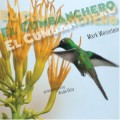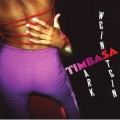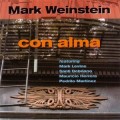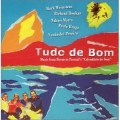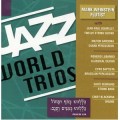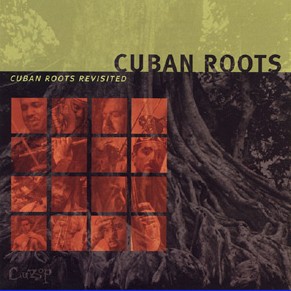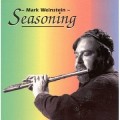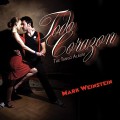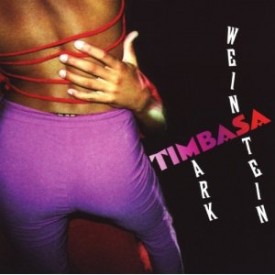
Reviews of Timbasa
What do you want from your Latin jazz album? Great musicianship? Authentic music? Danceable? Must it have great rhythm, catchy tunes and present the best in Latin percussion? Mark Weinstein is a name not immediately associated with the best of Latin jazz, but he has done it again with Timbasa, a fantastic recording and his fifth as leader. There isn’t a dull moment on this classic Latin jazz party album. Cuban-inspired-and with Cubans gracing the percussion chairs, piano included-Weinstein leads this group of young virtuosos, transforming jazz classics including “Milestones,” “Footprints,” “Watermelon Man” and “Caravan” into Latin dance grooves.
Weinstein is a band leader, a writer, an arranger and a producer. More importantly, he is a very good flautist with a passion for Latin music. When Weinstein is involved, be it Brazilian or Cuban music, it is always played with authority, intensity and honesty. On Timbasa, Spanish for party, the flute leads the percussion-heavy band through songs that give all members a chance to showcase their skills. Miles Davis’ opener, “Milestones,” is the launching pad for a fiery display of Cubano percussion magic, with pianist Axel Tosca Laugart’s first solo, following Weinstein’s, shining brightly and fitting in amongst the many greatest pianists with which Weinstein has played, including Chick Corea, Kenny Barron, Omar Sosa and Mark Levine.
The arrangement of Herbie Hancock’s “Watermelon Man” is superb, while Wayne Shorter’s “Footprints” is a beautiful journey through some jungle paradise. Laugart and Weinstein play off each other with passion, trading runs and communicating on a high level. Bassist Panagiotis Andreou feeds off the percussionists and lays down verse after verse of dynamic playing, bringing a Middle Eastern feel to the opening of “Caravan” with fusion style solo bass and chanting vocals. The entire band then jumps on the groove, with Weinstein playing the traditional “Caravan” phrasing; a mix of classical, layered upon Flamenco, as the percussion assembly lets loose with wild rhythms, spurring Laugart into action, as he creates a sand storm of notes that swirl and roar across the plains.
Timbasa’s four original songs-two by percussionist Pedrito Martinez, one by Weinstein, and one co-written by Andreou and Weinstein-are all entertaining. Timbasa has all of the ingredients of a first rate Latin jazz recording, as Weinstein-accompanied by this stellar group-is at the top of his game.
by Paul Youngman — AllAboutJazz.com
It would seem that there is no stopping flutist, Mark Weinstein. While the composer and instrumentalist extraordinaire may not have trumped his awe-inspiring expedition into the realm of improvisation, Tales From The Earth (Ota Records, 2009) his album, Timbasa has certainly turned out to be an alchemist’s dream. Who would ever have imagined that Miles Davis’ languorous performance of “Milestones” could be regenerated as an extravagant and masterful Afro-Cuban adventure? And yet, between percussion colorist, Pedrito Martinez and Weinstein that chart has been completely reborn, making even Miles’ original literally a thing of the past. As sacrilegious as that might sound, it remains absolutely true.
Beginning with the thunderous report of congas, timbales and batas, accented with splashing cymbals and drums clod-hopping in a mad dance around bass and piano the ensemble awaits the fluttering ululation of Weinstein’s concert flute. No sooner does he enter the proceedings, he completely deconstructs the melody with dazzling gymnastics turning Miles’ tune into a hypnotic, percussive masterpiece. This he daubs with superb touches of color and harmony giving it an ethereal beauty that is quite incomparable, while the percussionists-three in all-take the music to a breathtaking crescendo that sucks the proverbial air out of the lungs.
From there on it is all upward. “Timbasa” is another mesmerizing chart, an invitation to party for as long as there is music-something that the inner ear wants never to end. Wayne Shorter’s “Footprints” is equally transformed as the Miles Davis chart. Weinstein retains the mysterious, metaphysical nature of the piece but redecorates all else, especially the harmonic progression, which no longer dances in a predictable linear manner, but is more vertical and otherworldly. Herbie Hancock’s eternal “Watermelon Man” is also magnificently reborn with a new rhythm bestowed upon that swaggering vendor of the luscious fruit.
But perhaps the greatest transformation of a classic is reserved for Duke Ellington’s deeply mysterious “Caravan.” To begin with, bassist, Panagiotis Andreau vocalizes a new opening sequence somewhere in between a Turkish muezzin calling the faithful to discover the existence of the Divine, while his fingers gallop like a caravanserai of mad nomads every which way that his bass will allow them to roam. Even the body of the piece that normally sways like a mirage in the heat of the desert begins to dance as if fired up by a thousand dervishes.
Such exquisite work adorns every track on the album, including the wonderful piece of musical tapestry that Andreau and Weinstein have woven in “Kavaklari Cubano,” a wondrous Mediterranean number that turns bewitching as Weinstein works his magic on flute. In the liner notes it appeared odd that Weinstein would heap such unabashed praise on the musicians who accompanied him on this sojourn. However, by the time the last notes of his deceptively nondescript “Just Another Guajira” it is no wonder that the flutist found this to be his finest accompaniment on record.
by Raul d'Gama Rose — AllAboutJazz.com
First came the transition from trombonist to flutist. Then came the transition to Latin jazz. For Mark Weinstein, a confluence of worlds has become modus operandi.
Brooklyn-born Weinstein’s experience has included a fusion of post-bebop music with traditional Afro-Cuban drumming. As a trombonist, he worked with Chick Corea, Cal Tjader, Tito Puente, Maynard Ferguson, Herbie Mann, and many others. Since he began playing the flute, Weinstein has performed in a variety of settings, covering several styles including Afro-Caribbean, Brazilian, and North Indian.
The three-player percussion section introduces “Milestones,” a high-energy piece that sets the stage for what follows. Weinstein is in league with the likes of Mann, Alexander Zonjic, and Tim Weisberg, putting the flute through some rapid-fire phrases. Axel Tosca Laugart is dazzling on piano. After the solo, he and Panagiotis Andreou answer the calls of Mauricio Herrera, Ogduardo Diaz, and Pedrito Martinez in an extended dialogue that showcases the percussionists’ cohesion as a group. Each individual, however, absolutely knows how to make a mark.
Wayne Shorter’s “Footprints” is that rare jewel that has been covered many times but doesn’t become stale. The strong Latin flavor of this arrangement sets it apart from many others. Andreou’s bass line is strong, and the piano solo is one of the song’s many highlights. Andreou equals the piano on bass during his time to step into the center of attention, a position he returns to a few tracks further on.
He goes it alone to introduce “Caravan” and the free-form bass is accompanied by Andreou’s chant. While continuing his strong play, the rest of the ensemble joins him. The bass bridges solos by Laugart and Weinstein. After the flute solo, piano and bass frame a mini concerto by the percussionists.
Weinstein doesn’t make it easy to select one song that tops all the rest. Each track stands well on its own. But as a set, Timbasa is solid across the board.
by Woodrow Wilkins — AllAboutJazz.com
Perhaps the hardest-working man in jazz today, flautist Mark Weinstein is back with yet another Latin jazz release – this time with award-winning Cuban percussionist Pedrito Martinez (with whom he worked on his Algo Mas and Con Alma albums. Busy having just released Jazz Brasil with Kenny Barron and with another shortly to be released (the Brazilian-flavored Lua e So – he has released 15 albums since 1996) Weinstein was somewhat reticent when approached by Martinez to record again, but was convinced when the percussion master said he could supply a group of truly exceptional (mostly) Cuban musicians. The album was recorded in one day-long session and captures the excitement that is produced when great players are put together and set free. Classic tunes covered include “Milestones,” “Footprints” (in 7/4 – a true highlight!), Herbie Hancock’s “Watermelon Man,” Chucho Valdes’ “A Ernesto” and a rollicking “Caravan,” while four originals (including a great album-ending version of Weinstein’s “Just Another Guajir” – revisited from his 1960’s classic Cuban Roots album). As always, Weinstein’s flute is dancing and delightful – at times recalling the groundbreaking Herbie Mann, while pianist Axel Tosca Laugart is an absolute knockout (Weinstein says he is the best he has recorded with – high praise considering he has played with Barron and Chick Corea). Imaginative electric bassist Panagiotis Andreou (check his introduction to “Caravan” where he sings and plays along) , drummer Mauricio Herrera and bongo/bata player Ogduardo join Martinez to form what Weinstein says is the best rhythm section he has ever played with (yet another amazing claim from someone who has played with some of the best Afro-Cuban groups of the last fifty years). It is hard to argue with Weinstein as the rhythm section really shines. Despite the energetic and intricate drumming and juicy bass solos, the music here is often as relaxed as an island beach – and although it is toe-tapping, it doesn’t raise your heart-rate to unacceptable levels like someof the most blistering and in-your-face Afro-Cuban music. The 69-year-old Weinstein is experiencing a resurgence of his career and continues to produce some of the finest recordings of Latin jazz around. No sign of slowing down either – he says he has two new tango albums in the work.
by Brad Walseth — JazzChicago.net
It’s not uncommon to hear about an alto player moving to tenor, or vice versa, in an attempt to grow musically, develop a different sound or avoid getting stale. Likewise, plenty of people branch out within the woodwind or brass families, like a saxophonist learning to double on flute or a trumpet player doubling on valve trombone. Yes, these things do happen fairly often but you rarely hear about masterful jazz trombonists switching to flute. Mark Weinstein is the exception.
Weinstein, while playing trombone in the 1960s, worked with the cream of the crop, straddling the Latin and jazz communities. He worked with everybody from Chick Corea and Eddie Palmieri to Clark Terry and Charles Mingus. Though he retreated from the music scene in the early ’70s, earned a Ph.D in Philosophy and became a college professor, music must have been on his mind at times. Eventually, he returned to the music scene and was reborn as a flautist. Weinstein began recording a string of strong and musically diverse albums in the late 1990s and he keeps moving forward.
Timbasa features Weinstein performing some killer Cuban jazz with an exceptional band. Axel Tosca Laugart lights up the music from behind the piano and Panagiotis Andreou has a firm presence on bass. The material chosen for this album, much like the music from Weinstein’s Con Alma (Jazzheads, 2007), is a mixture of Latin-ized arrangements of jazz classics and new compositions. While that recording features flute, bass, piano, drums and percussion, Timbasa benefits from having two percussionists, with Pedrito Martinez and Oguardo Diaz – alongside drummer/percussionist Mauricio Herrera – creating some rumbling and tumbling patterns, and bringing some Latin fire into the mix.
While a few of the classics, like “Watermelon Man,” already fit well within this genre, Weinstein takes some other tunes by the likes of Miles Davis and Wayne Shorter and reshapes them to fit his own vision. Weinstein and Laugart both get plenty of solo space on the album and Andreou bridges the gap between these two men and the percussion section. The bassist also gets some room to let loose and his explosive bass and vocals on the introduction to “Caravan” are a treat. Some of the most heart-pounding moments on the album take place when the pitched instruments provide simple vamps and the three-man percussion wrecking crew is left alone to create a storm beneath them. With the exception of the Middle-Eastern tinged mysticism of “Kavaklari Cubano,” this music is high-energy party jazz and Weinstein always seems to find the right balance between the sound of a loose jam and that of a tight Latin unit.
by Dan Bilawsky — AllAboutJazz.com
Collaboration lies at the heart of any musical endeavor, and often times, a project’s success relies upon musicians working together coherently. This concept proves ultimately important in Latin Jazz ensembles, where trust and collective thought enable truly meaningful and interesting improvisation. For many groups, collaboration can be a learned skill; it becomes the art of give and take, where musicians learn when how to grab the spotlight and when to support their peers. Sometimes this lesson sinks into the ensemble quickly, and for some musicians, it takes years of shared musical experiences to refine their group process. Live performance often serves as the training ground for this process, giving musicians the chance to rise or fall through their team work. The recording studio tests the heart of a group’s collaborative spirit, capturing their musical output and exposing the success of failure of the group’s mutual work. When a group of musicians come together for the first time in the studio, they face an interesting challenge – since they don’t have years of trust built into their relationships, their collaboration needs to be based strictly upon musicality. Success involves an open mind, a mature artistic attitude, and high level musical skills; a hole in any of these areas can curse the project. Flautist Mark Weinstein works with a group of young Cuban musicians on Timbasa, creating a highly collaborative environment that sparks some amazingly original and exciting interpretations of standards and new compositions.
Imaginative Arrangements Of Jazz Standards
Weinstein and his group turn several classic jazz standards inside out with imaginative arrangements and impressive performances. The drummers establish a very modern take on a son montuno as Weinstein and pianist Axel Tosca Laugart visit the classic melody on Miles Davis’ “Milestones,” accompanied by long round notes from bassist Panagiotis Andreou. Weinstein explodes into a flurry of quick runs over the assertive accompaniment from the rhythm section, delivering a fast and furious display of creativity. Laugart quickly contrasts Weinstein with a quietly intense entrance into his solo, using tense syncopations to drive the band into energetic solos from Ogduardo Diaz on bongó, Pedrito Martinez on congas, and Mauricio Herrera on drums. Andreou lazily implies the classic bass line to Wayne Shorter’s “Footprints” before the rhythm section kicks into a seven beat cycle behind the melody with short leaps into cha cha cha on the turnaround. Weinstein floats over the odd meter groove with a relaxed fluency, spinning long lines full of rapid runs and sharp accents. Laugart moves around the seven beat cycle with a confident vigor, using the groove’s natural tension to his advantage, until Andreou makes a short statement, running low melodic lines through the texture. The rhythm section places their own mark upon Herbie Hancock’s “Watermelon Man” with a laid back cha cha cha groove while Weinstein personalizes the familiar melody with liberal embellishments. Weinstein flies over the funky background with a bluesy edge, prodding the rhythm section with assertive lines, while Laugart uses broad open washes of understated lines to build his statement. Panagiotis combines rising sequences and virtuosic lines to construct an attention grabbing solo before the rhythm section provides an off-set series of attacks for an exciting improvisation from Martinez. These pieces find the group working together to produce highly original arrangements and awe inspiring performances that shed new light upon classic tunes.Applying A Distinctive Performance Approach To Latin Jazz Pieces
The group adds their distinctive performance approach to repertoire closer to home, developing interpretations of pieces from the Latin Jazz world. Quick ascending lines explode into a broad pedal tone full of forward motion on Chucho Valdes’ “A Ernesto” before the rhythm section establishes a short vamp for Weinstein’s improvisation. The flautist charges into a frenzied combination of bebop licks and traditional Cuban phrases, inspiring enthusiastic response from Laugart and Herrera. A sharp break from the rhythm section allows Laugart to storm into his improvisation with a bluesy swagger evoking the spirit of the song’s composer with virtuosic flights of jazz melodies that lead into an impressive series of solo from all three percussionists. Andreou melds amazing bass technique, impeccable musical construction, and sung accompaniment into an inspiring introduction for Duke Ellington and Juan Tizol’s “Caravan.” After Weinstein visits them melody with a free sense of phrasing, Laugart dramatically enters his improvisation, stretching musical lines into a long statement full of staggering rhythms and engaging melodies. Weinstein crafts an interesting solo that explores the edges of the song’s harmony, moving into a stunning timbale solo from Martinez. A laid-back funky vamp from Laugart and Andreou give a boogaloo feel to Weinstein’s “Just Another Guajira,” while Weinstein plays the familiar melody over the band. Laugart jumps into a tasteful improvisation that captures the song’s laid back feel, followed by Weinstein, who pushes the groove with quick lines and a bluesy edge. Andreou storms through a ferocious improvisation that combines percussive lines with chordal passages, and after Weinstein returns to the melody, Martinez opens into a polyrhythmic improvisation full of energy and class. These pieces once again offer a different perspective on familiar tunes, utilizing the collection power of the group to reinvent Latin Jazz classics.Exploring Original Compositions From The Group
Weinstein appreciates the contributions from his group, taking the time to explore several of their original compositions. Jaw dropping percussion fills explode over a clave figure on Martinez’s “Timbasa,” leading into a rhythmic unison melody from Weinstein, Laugart, and Andreou. Weinstein stretches across a long improvisation, taking his time to build his ideas into a wild frenzy before Laugart glides over the keyboard with a distinct sense of rhythmic placement and thematic development. Andreou starts his statement with understated melodies, opening into impressive runs across his instrument until a spectacular percussive trade between Diaz, Martinez, and Herrera. Weinstein riffs around Andreou’s Middle Eastern vocal scat on “Kavaklari Cubano,” until batá drums provide a Cuban background to the cultural blend. Andreou sings along with his bass and Laugart on a slow and contemplative melody, as the group builds into a dramatic flourish for a contemplative improvisation from Weinstein. The group wraps around the vocal melody again, taking dynamic turns to let Andreou and Weinstein extend their ideas and contribute thoughtful embellishments. Laugart introduces an engaging vamp over driving percussion while Andreou riffs on Martinez’s “Encuentro,” leading into a catchy melody from Weinstein. The rhythm section turns up the heat behind Weinstein’s improvisation, driving the flautist to hit sharp rhythmic accents and fast runs. Both Laugart and Andreou thrive off the song’s addictive groove, building attention grabbing solos, until aggressive percussion statements from Herrera, Martinez, and Diaz send the song into an exciting climax. These tracks allow Weinstein to share his ideas with the group and bring their compositional voices into the forefront of the album.A Memorable Collaboration Between Master Musicians
by Chip Boaz — The Latin Jazz Corner
Weinstein displays a supremely collaborative spirit on Timbasa, letting his musicians stretch their chops and enjoying the outcome. Despite the fact that this studio date represents an early effort from the group, Weinstein enables an environment where all the musicians work together fluently, showing both individuality and team effort. There’s a distinctly modern approach from Weinstein’s sidemen throughout the recording, mixing equal pieces of timba energy, Irakere influenced experimentation, and contemporary jazz harmony. While the band’s roots differ from Weinstein’s background, the flautist has spent his career exploring new and challenging repertoire. The band aggressively pushes Weinstein with their high energy approach and the flautist responds with some of his most engaging playing. As the musicians approach standards, they respect tradition, but they also rip each tune open and search for their own identities. Weinstein encourages the exploration and enters each familiar tune with a new perspective that delivers inspired playing. Laugart emerges as a potentially major voice in Latin Jazz piano, while Andreou presents a unique and impressive bass presence that demands attention. Martinez, Diaz, and Herrera supply a triple threat, providing an unstoppable percussion section with an interactive spirit and considerable improvisation abilities. Each song on Timbasa unfolds with inspiring and joyful performances that make this a memorable collaboration between master musicians.
Back in the day, people going to their first Grateful Dead show were given this advice: “If you get bored, just watch the drums.” The spirit of that advice is applicable to flautist Mark Weinstein’s latest CD. Not that Timbasa is boring, far from it-if anything, this should be counted as the first great jazz party disc of 2010. But as great as Weinstein is here, his percussion section’s overall performance is off the charts.
On balance, “Milestones” is one of the more conservative pieces in trumpeter Miles Davis’ catalog. But put Cuban percussion masters like drummer Mauricio Herrera, conguero/co-producer Pedrito Martinez and bongo master Ogduardo Diaz behind this disc-opener, and things get tribal in a big hurry. Weinstein’s lines are absolutely thrilling as the piece builds momentum, and even though the group pulls back for Axel Tosca Laugart’s piano solo, the piece’s edge stays extremely sharp.
Weinstein may not have the accuracy of Dave Valentin or Herbie Mann, but he more than makes up for that with a relentless passion that runs through every piece on Timbasa. He stuffs Wayne Shorter’s “Footprints” into a 7/4 time signature and makes it work, albeit with a terrific assist from Laugart. Herbie Hancock’s “Watermelon Man” doesn’t have to be stuffed, because it lends itself perfectly to the disc’s Cuban vibe, as does the Duke Ellington/Juan Tizol collaboration “Caravan” and Chucho Valdes’ calypso-on-steroids rave-up “A Ernesto.”
It’s not all covers, though. Weinstein’s “Just Another Guajira” offers sweethearts everywhere a chance to step onto the floor and let it all hang out. In addition to Martinez’ stellar work on congas, he contributes a title track that lets Herrera truly go to town, and Weinstein positively wails on Martinez’ second offering “Encuentro.”
While it’s good that jazz can be the most cerebral music around, it’s also a good thing to turn the mind off and let the mojo run things for a while. Timbasa is a satisfying reminder that sunshine, sandy beaches and Mojitos are on the other side of the snowstorms of winter.
by J Hunter — AllAboutJazz.com
Red-hot off the presses and out on the street from 9th February is Mark Weinstein’s hottest offering yet, Timbasa. So hot, it completely incinerated my stereo and set my ears, soul, mind, feet and heart on fire. The title derives from timba – party. And what a party!
Jazz flute and Afro-Cuban jazz giant Weinstein assembled some of the finest and brightest young Cuban talent in the US for this album. The percussion ensemble is the finest Afro-Cuban percussion ensemble yet, led again by Pedrito Martinez, first heard on Mark Weinstein’s Algo Más (and on Con Alma) and whose star shines brighter than ever. An absolute sensation also is pianist Axel Tosca Laugart – unquestionably the finest Latin jazz pianist I have heard yet, bar none. Laugart is so hot it wouldn’t surprise me if his ivories caught fire. Mark his name well, for I should be most surprised indeed if we didn’t hear an awful lot more from and about this truly prodigiously gifted young pianist. Anchoring the rhythm section is outstanding bassist Panagiotis Andreou with an amazing ease and instinct of rhythm and time.
The exemplary virtuosity of all the players on Timbasa is perfectly matched by the absolute joyousness of their fiery performances. Mark Weinstein’s flute and improvs attain yet greater heights than ever. All around, the soloing is out of this world. And Weinstein’s unquestionable prowess as an arranger shines as ever, and as ever is tempered by a healthy respect for history.
The material on Timbasa is an unbeatable combination of some of the best-loved classics and blistering originals – one by Weinstein himself, another by Weinstein with Andreou, and two by Martinez. A perfect blend that will set any party on fire, and blow away any blues no matter how bad.
The opener, Miles Davis’ classic Milestones, sets the pace and tone as well as the standard for the rest of Mark Weinstein’s Timbasa. A more joyous and joyful version of this, perhaps Davis’ best-remembered composition, would be hard to imagine. Weinstein’s almost frenetic improvs are sheer magic, as indeed they are throughout the album. His sidemen likewise prove they mean business straight from the off. The title track, Timbasa, a contribution by Pedrito Martinez, is also a joy, especially also its complex breaks or cierres that are sheer perfection and its closing percussion fireworks exchanges between Martinez, Herrera and Diaz. At 9 minutes 16 seconds, this is the longest track, but as with all of them you wish it didn’t have to end.
Wayne Shorter’s immortal classic Footprints receives one of the most unusual and imaginative treatments yet, the 7/4 time helping emphasise its Middle Eastern connections and the somewhat mysterious, even eerie aspects of the melody. Yet another great classic, Herbie Hancock’s Watermelon Man, helps eliminate a block here – whenever thinking of it, until now I haven’t been able to get a certain (superb in its own right) comedy version of a few years ago of this fabulous tune out of my head. Weinstein’s version on Timbasa has not only restored this tune for me, it is undoubtedly one of the most exciting interpretations yet. A particular standout also is a superb bass solo from Panagiotis Andreou.
Yet another classic, Chucho Valdez’s A Ernesto, provides another superlative showcase for Mark Weinstein’s flute, here to the beat of Cuban guaracha-son. At nearly half-way through, Laugart opens his piano solo with a fun quote from that old 1930s “turkey” Yes Sir, That’s My Baby and then lets fly, dominating the rest of this fabulous piece. At just over nine minutes the second longest track on Timbasa, the unforgettable Ellington/Mills/Tizol classic Caravan here receives its most distinctive treatment yet. Over the years, I must have collected somewhere between a hundred and two hundred different versions of this entrancing masterpiece of the Duke and heard hundreds more. Yet none quite as memorable as this! Caravan opens with a bass and vocalese intro of over two minutes, highlighting the Middle Eastern roots of this tune as well as the Arabic/Hebraic influences in Afro-Cuban music. This intro in itself is stunning and almost worthy of a separate track. As the percussion and piano come in the scene is set for Weinstein’s flute to eloquently state the theme and then sore off into flights of fancy, answered by Laugart’s equally eloquent ivories. Funk, Yoruba-based Afro-Cuban yesa rhythms and Middle East melt and meld together as a single cohesive whole.
The second of Martinez’s originals, Encuentro, has Weinstein’s soaring flute solo followed by an extensive fine solo from Laugart, in turn followed by one from Andreou, before letting the percussion reign supreme for a while. Kavaklari Cubano, an Andreou and Weinstein original, is based on a Turkish folk song. This provides the perfect showcase for Weinstein’s wonderful rich bass flute as well as Andreou’s vocals. The percussion is also out of this world. Featuring the Afro-Cuban religious drums of the Santeria tradition, the batá, here the drumming often reminds of the darbuka, sometimes even of the Iranian tombek or Indian tabla in its intricacies and subtlety of tone.
All too soon the closer of Timbasa is reached in the form of an old, familiar Weinstein original, the classic Just another Guajira. First heard on Weinstein’s revolutionary sensational 1960s cult album Cuban Roots, this particular version is the finest yet. Blues-inflected and elegant, Just another Guajira rounds this album off perfectly with some soaring flute improvs from Weinstein.
As has been remarked already, the soloing on Timbasa is simply sensational all round. And Weinstein’s in particular sounds on finer form than ever, somehow more confident and assertive, authoritative. The voice of his flutes, whether concert, alto or bass, is also attaining ever greater heights of perfection. Mark Weinstein at last seems to be finding some of the confidence to believe that he really does belong up there with the other true jazz greats of the past, which he unquestionably does.
The length of the tracks tends to be nice and meaty, with three of them being of a reasonable length for surely getting lots of airplay. Surely as sensational, compelling, and consistent an album as Timbasa cannot fail to bring the success and acclaim it so richly deserves.
Mark Weinstein’s Timbasa is one hell of a party that you just don’t want to stop. Latin jazz, or Afro-Cuban jazz, at its very finest. An album that’s just pure magic. No collection of Latin music, Latin jazz, Afro-Cuban jazz or for that matter World music could ever be complete without Timbasa. Or really, any good music collection. Or even if you just like to groove. Best listened to in fire-proof clothing and surrounds though! Hot hot HOT!
by Rainlore's World of Music
